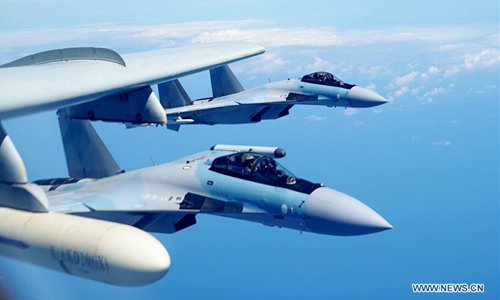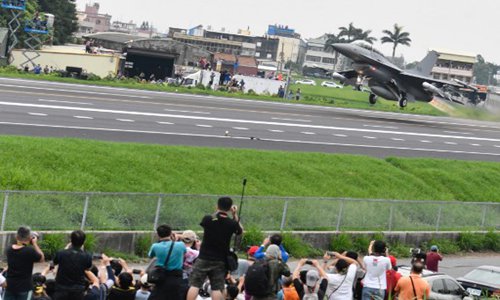HOME >> CHINA
Taiwan arms sale slammed
By Liu Xuanzun Source:Global Times Published: 2019/7/9 21:23:40 Last Updated: 2019/7/9 23:41:23
Washington uses island secessionists as a card: experts

Two Su-35 fighter jets and a H-6K bomber fly in formation on May 11, 2018. The People's Liberation Army (PLA) air force conducted patrol training over China's island of Taiwan on Friday. Su-35 fighter jets flew over the Bashi Channel in formation with the H-6Ks for the first time, which marks a new breakthrough in island patrol patterns, said Shen Jinke, spokesperson for the PLA air force. Photo: Xinhua
The latest US approval of arms sales to the island of Taiwan will hurt delicate China-US relations at a sensitive time when China and the US are to resume trade talks, and Taiwan secessionists should know that they are only being used as a card by the US, Chinese experts warned Tuesday.
Even if the island acquires US weapons, the Chinese mainland still has an overwhelming advantage over the island in military strength, and Taiwan secessionists should not expect US protection in case of a military conflict, they stressed.
At a routine press conference on Tuesday, Foreign Ministry spokesperson Geng Shuang urged the US side to immediately cancel the plan to sell arms to Taiwan and end its military links with the island, before it causes more harm to China-US ties and the peace and stability across the Taiwan Straits.
The US arms sales to Taiwan severely violate international law, the basic norms governing international relations, the one-China principle, the three China-US joint communiqués and interfere in China's internal affairs, undermining China's sovereignty and security interests, Geng said.
"The Chinese side is strongly dissatisfied with and firmly opposed to the US plan to sell arms to Taiwan. We have lodged stern representations with the US side on this," Geng said.
The US should immediately withdraw its arms sales to Taiwan and stop sending the wrong signals to "Taiwan independence" separatists, the Chinese mainland's Taiwan Affairs Office said on Tuesday.
The US State Department approved a possible $2.2 billion arms sale to the island of Taiwan. The potential sale includes 108 M1A2T Abrams tanks, plus related equipment, and 250 Stinger missiles, CNN reported on Tuesday.
The tanks are worth about $2 billion, and the portable surface-to-air missiles cost $223 million, CNN reported.
Chinese President Xi Jinping and US President Donald Trump agreed on June 29 to restart trade consultations on the sidelines of the G20 Osaka summit, after a yearlong trade war between the world's two largest economies.
"The arms sale approval shows the US is increasingly disregarding China-US relations… The US is adjusting its China policies toward confrontation on all fronts," Li Haidong, a professor at the China Foreign Affairs University's Institute of International Relations in Beijing, told the Global Times.
In the first Taiwan arms sale deal under Trump's presidency, the US went ahead with a $1.42 billion arms sale to the island of Taiwan involving missiles and torpedoes in June 2017.
The US then sold $330 million worth of spare parts for warplanes in September 2018 and a $500 million package in April involving pilot training.
The latest deal is the biggest in sum, and China should realize that the US will unlikely stop such sales anytime soon, which is bad for China-US relations and cross-Straits relations, Li said, noting that arms sales to the Taiwan region have been used by Washington since it established diplomatic relations with Beijing.
Taiwan also applied for 66 F-16V fighter jets at the recommendation of the US in February, but the deal was put on hold due to tensions between China and the US, Taiwan News reported.
"If the US continuously sells weapons to the Taiwan region, it would wrongly encourage Taiwan secessionists to further misjudge the situation and may eventually lead to military confrontations. This will hurt everyone's interests," Li said.
At a gathering marking the 40th anniversary of the issuance of the Message to Compatriots in Taiwan in January, Xi pledged "utmost sincerity and greatest efforts" for the prospect of peaceful reunification, but he made no promise to renounce the use of force.

A US-made F-16V fighter jet takes off from the freeway in Changhua county, Taiwan, as a crowd takes photos during the annual Han Kuang drill on May 28, 2019. Photo: AFP
Futile arms sales
Military experts said the Chinese mainland military enjoys overwhelming superiority to the island's, even if Taiwan gets US weapons.
The People's Liberation Army, which retains "liberation" in its name, has developed rapidly in the past years with certain weapons and equipment able to rival the US' ones; and it could simply outnumber Taiwan troops, a mainland military expert, who asked not to be named, told the Global Times.
The arms sale also received a negative reception within the island, as some netizens there said the island's authorities should spend the $2.2 billion on economic development.
Taiwan regional leader Tsai Ing-wen "used our tax money [for useless things]," read a comment.
"A Stinger missile costs $38,000, and the US is selling it for $900,000." "That is more than 20 times more expensive. Isn't that bad business?" another posted.
The M1A2 tanks are also not suitable for Taiwan. Wei Dongxu, a Beijing military analyst, said that the 60-ton tank, although technologically advanced, is too heavy for an island like Taiwan that has a dense river network and weak roads.
To counter a potential mainland amphibious landing, Taiwan could only deploy the tanks on shores, but this will only make them targets for mainland missiles, Wei said.
"The potential weapon purchase is merely the island's attempt to pay more protection money to the US. However, this will not save Taiwan secessionists," Wei said.
Taiwan only a pawn
China and the US are stuck in a trade war and the US is playing all kinds of cards to create trouble and pressure China. Taiwan is one of them and nothing more, analysts said.
The US is using Taiwan secessionists to obtain its own interests, Li said, noting that the secessionists do not care about China-US relations, so they could take the US bait and risk it all.
But the US will only let the people of Taiwan suffer the consequences if the risk spirals out of control, Li noted.
Wei said that the arms sale could give secessionists in the island an illusion of US support, but the US military will by no means fight for Taiwan, especially against an opponent as powerful and determined as China.
China and the US, the two largest economies in the world, are playing a game, and while China sees the island of Taiwan as an inalienable part of itself, the US only sees it as a pawn, analysts stressed.